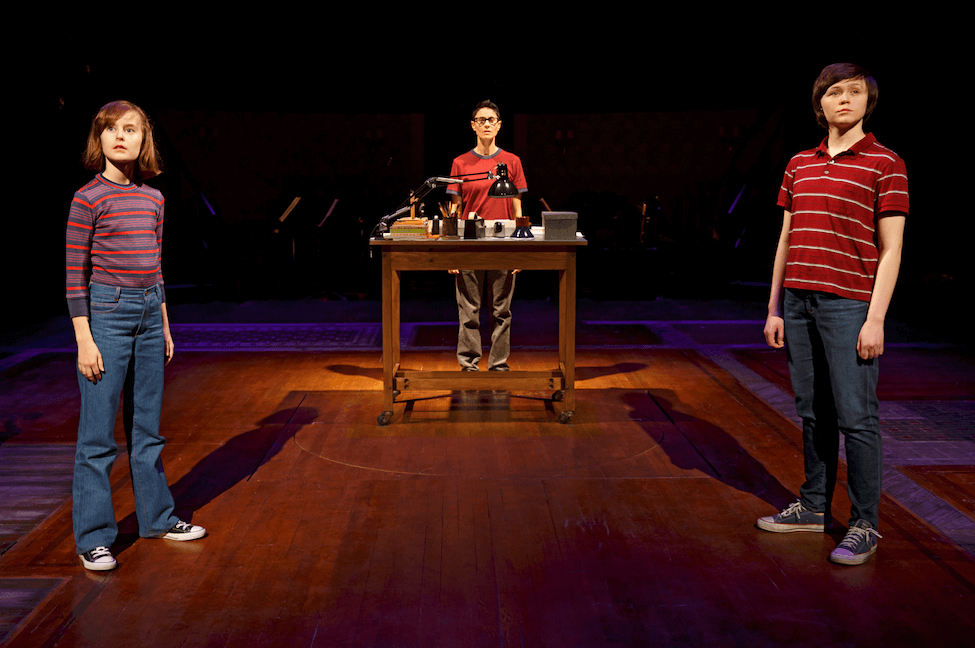Home Is Where the Fun Is: Alison Bechdel Triumphs On Broadway

Sydney Lucas as Small Alison, Beth Malone as Alison, and Emily Skeggs as Medium Alison in “Fun Home” (c)Joan Marcus
Fun Home, simply put, is an incredible musical, perfectly embodying the liminal space that exists in all families—the space where you feel pain and joy, frustration and liberation all at the same time. This is, essentially, the space that defines what it feels like to go back home again. Families are both the most familiar and the most tenuous parts of our identities, and Fun Home digs deep to get at the truth of who our parents are, while also revealing—and being understanding of—the fact that those answers are always out of reach. Instead, it is the main character Alison who uncovers her own authenticity and rises up, as a fully formed person, beyond the legacies of her mother and father.
The musical is based on Alison Bechdel’s graphic memoir about growing up in a funeral parlor with a father who led a double life: He was both a high school English teacher with an obsession for historical renovations, as well as a gay cruiser with a penchant for underage boys. When Alison goes to college, she begins to identify that she too is gay; just months after she comes out to her parents, her father walks in front of a truck and dies.
What made Bechdel’s graphic memoir so compelling is also what allows the musical to flourish—there are moments when Bechdel recognized that words alone could not completely express the mixed emotions of her childhood, and so she employed her cartoon skills to draw us the picture. This is the same thing that happens in the musical; as soon as one character begins to feel villainous, or one-dimensional, he or she has a song that completely undermines any previous maliciousness, giving us a way to connect with the character’s unfulfilled longing. The eleven o’clock number, Days and Days, is the perfect example of this, as the extraordinary Judy Kahn (who plays Alison’s mother, Helen) becomes more than just a resentful, bitter wife, but a complex woman who made plans for a life she never had the chance to live. This can also be said for the ever-weird, ever-watchable Michael Cervis, who plays the patriarch, Bruce. There are times when Bruce’s lack of care for his family is outright abusive, but then he sings about his own emotional repression in the song “Edges of The World,” and suddenly we understand that all his actions stem from the deep scars of shame that come with being a closeted person.
But Fun Home is not just a compendium of dark family secrets; it is also, and almost improbably, an exuberant happening. The Alison character is broken down into three stages of life, with little Alison played by Sydney Lucas, middle Alison played by Emily Skeggs, and the adult Alison watching her childhood, literally over her shoulder, played by Beth Malone. Sydney Lucas and Emily Skeggs sing two of the catchiest and most subversive show tunes I have ever heard. Lucas sings about her first glimpse of a handsome delivery woman, and how, though she cannot articulate the sexual desire, she feels a kinship with this “dyke-y” lady. Later on in Alison’s life, Skeggs sings the show-stopping number, “Changing My Major,” about her first college love, Joan. Lisa Kron, who wrote the book and lyrics, and Jeanine Tesori who wrote the music, use their combined and proven wit and skill to come up with these two hits, but the songs are more than just excellent examples of the form. Rather they—together with the musical as a whole—are revolutionary because they showcase Sapphic love, which is a topic that Broadway, with its more frequent odes to gay men, hasn’t necessarily thought of as box office dynamite. But it’s not ticket sales that matter here (though those have come, as well as a slew of Tony nominations), it’s the emotional connection this show makes with its audience.
That’s the genius of Fun Home—it strikes a magic chord in every one of its audience members. (There were moments when the whole audience was eerily silent, so lost in the show that we collectively forgot to applaud.) Fun Home reminds us—whether we’ve had a similar family dynamic or not—that separating ourselves from where we come is one of life’s most universal and challenging events.
It is the adult Alison that has the last words on the topic of from where—and whom—we come: “Every so often there was a rare moment of perfect balance when I soared above him.”
For more information about Fun Home visit here.
You might also like 



















